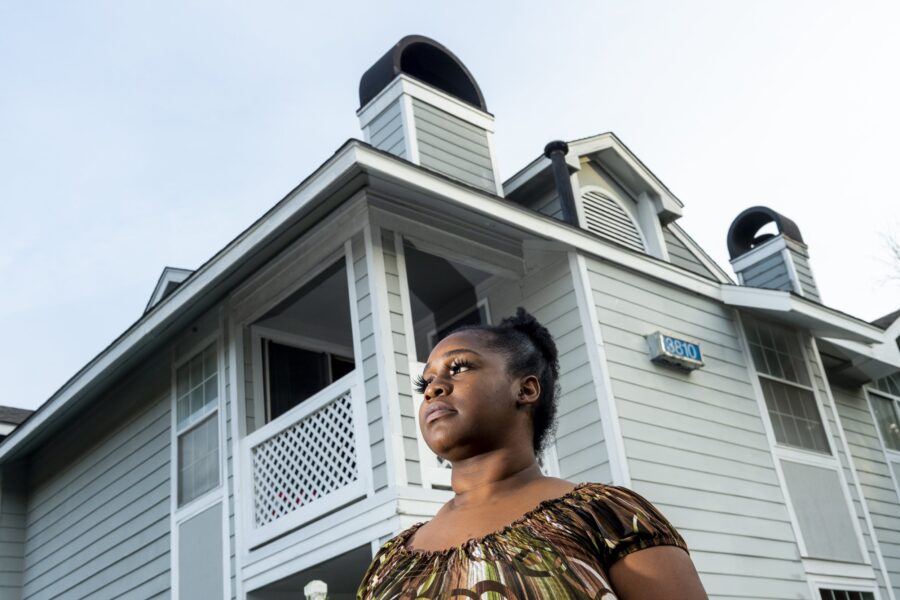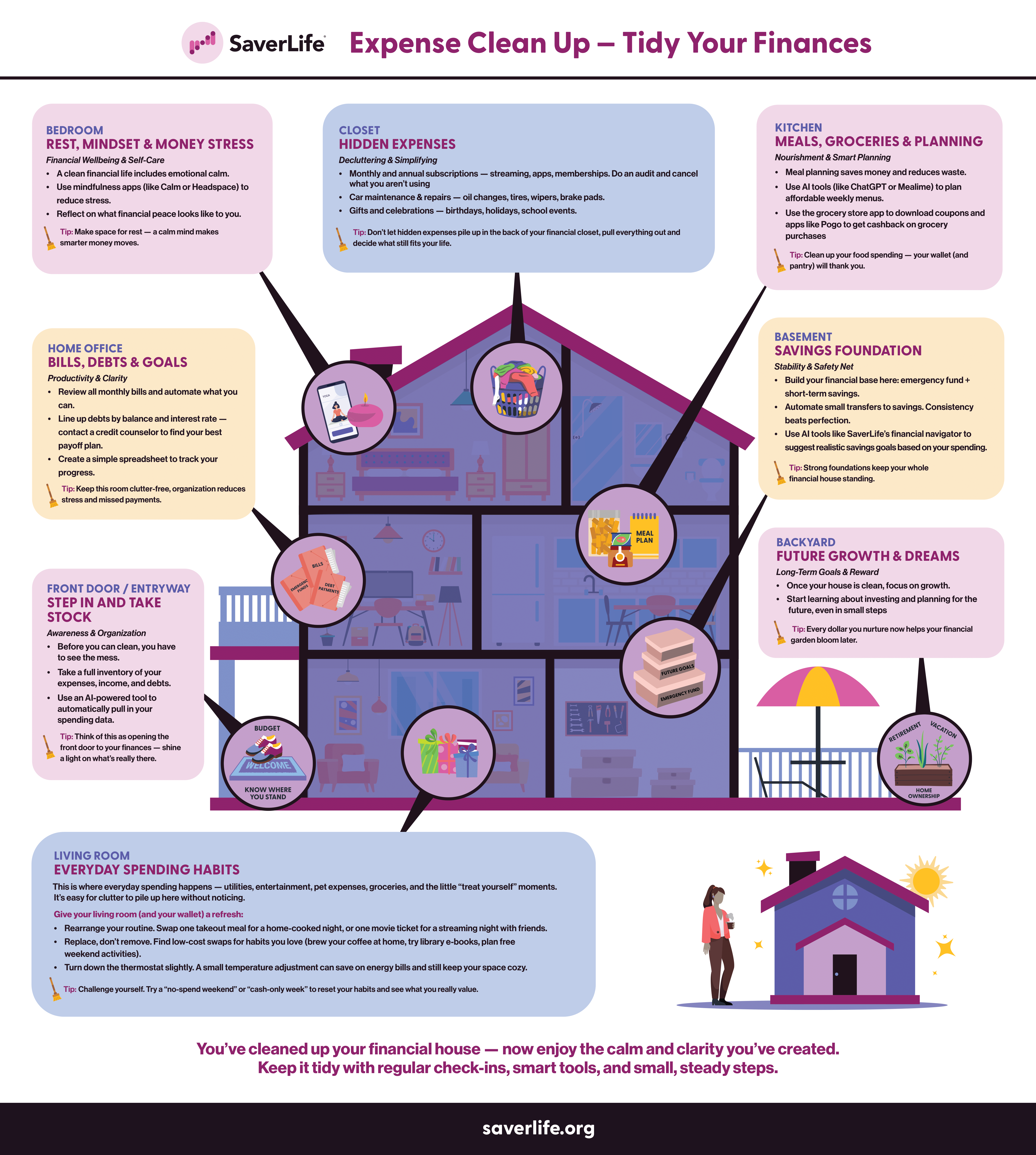
SaverLife member Shelly recognizes how closely her income and housing situation are intertwined. While Shelly works full time (and often more than one job) to keep her finances stable, her work hours and monthly income can fluctuate greatly. And this fluctuation causes a ripple effect on other aspects of her finances, often requiring her to make difficult trade-offs between covering utility bills, buying groceries, and paying rent.
Shelly has found ways to get by and even take steps toward her financial health goals. But she’s encountered multiple challenges along the way that have posed threats to her financial stability: the biggest being eviction. After making partial payments on her rent for several months, Shelly’s landlord told her to “save her money” and move out. At that moment, Shelly committed to strengthen her financial health, secure safe and reliable housing, and make sure they’d never have to worry about eviction again. “I’ve been homeless before, and I will never be homeless again,” she explains. “I don’t care what I have to do.”
Shelly’s experiences highlight her resiliency and determination to build a bright future for herself and her children. But the trade-offs she made between financial stability and rent also demonstrate a larger housing trend. Housing — through homeownership, renting, or even short-term stays — can have a lasting impact on the financial health of people living on low-to-moderate incomes. No matter what SaverLife members do to keep their budgets in check and stay on top of expenses, housing costs continue to eat up an oversized portion of their income. And the opportunities and resources needed to reduce their housing costs are largely inaccessible.
Read on to learn what SaverLife has uncovered about the close relationship between housing and financial health, and what we’re doing to build a financial system that better supports the housing needs and goals of the LMI community.
Financial stability and housing go hand in hand
If you find yourself making trade-offs between paying housing costs and covering other bills, you’re not alone. Through SaverLife surveys and interviews, our members have repeatedly shared that housing plays a major role in their financial stability. In fact, SaverLife uncovered that members who have a savings balance of less than $250 are 71% more likely to have moved in the past five years because of their financial situation.
Take SaverLife member Roshelle, for example. After relocating to several different states, Roshelle settled in a new rental with her three kids and committed to improving her family’s financial future. But even with her hard work maintaining a budget, she still found herself weighing out necessary expenses and prioritizing when and how she would pay them. According to Roshelle, her decision making started to sound like, “Okay, well, I need my lights on, and I need money to buy my kids food. It might be a longer process for my landlord to say, ‘Okay, well, we’re gonna start the eviction process.’ So we’ll wait on rent and deal with the problems when it comes to head.”
While Roshelle thankfully didn’t experience eviction, for every day that her rent was late, her account accrued a $5 fee, leading to a large debt on top of her monthly payments. The additional money owed on her housing increased Roshelle’s stress levels and left her feeling conflicted. She was glad to have a safe and reliable home for her three children, but she also felt like she had to put other necessary expenses — and her own financial goals — on hold in order to keep it. Because Roshelle couldn’t negotiate on the price of her home, she had to make difficult choices on other aspects of her financial situation to keep everything in balance.
Secure housing can have a ripple effect
Affordable housing is closely connected to financial security, and as many of our members have shared: it’s hard to have both at the same time, especially given the ever-increasing price tags on rent and mortgages. But the relationship between your financial situation and housing can go even further due to the ripple effect it can cause on other aspects of your life.
When asked the question “How would your life be different if your housing security problems were solved?” SaverLife members overwhelmingly shared that they would experience less mental and physical stress. They would have new breathing room to pause, rest, and take stock of their financial situation.
Members also shared that, with their housing security challenges resolved, they could tackle other financial aspects of their lives that they hadn’t been able to address before. These aspects included:
- Paying down debt
- Making home repairs
- Saving for emergencies
- Relocating to better housing
- Taking their families on vacation
- Covering other necessary expenses
- Investing in retirement and education
Financial and housing stability can have a major impact on SaverLife members’ ability to get by and even take steps toward their own goals. With affordable and secure housing, our members are more likely to keep their budgets in balance and have more time and energy to strengthen other aspects of their financial health. They can plan for the future and actually take steps toward that vision, rather than focusing their energy on keeping their financial and housing situations in check.
Your stories can change how we talk about housing
At SaverLife, we’re committed to supporting our members at every step of their financial health journeys. As part of our work, we’re advocating for policy changes that will create more opportunities for our members — and all people living on low-to-moderate incomes — to access affordable and reliable housing options. You can expect to see updates from us along the way about these systemic changes. Why? So that you have the most up-to-date information when making decisions about your own housing.
In the meantime, we encourage you to keep sharing your own housing experiences, advice, and resources in the SaverLife forum. The more you share with the SaverLife community, the more we can inform policymakers about your priorities and create systemic changes that reflect your goals. Plus, you might just inspire another SaverLife member to keep taking the next step on their own financial health journey.


